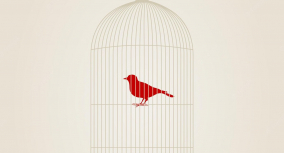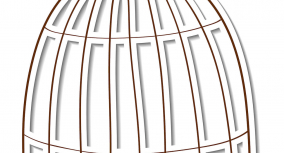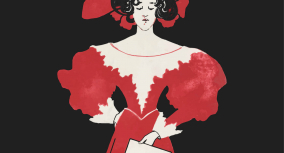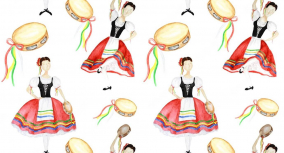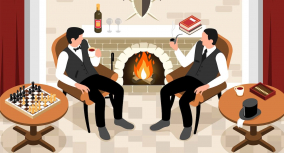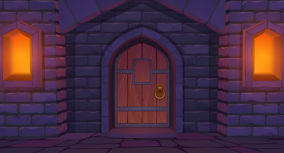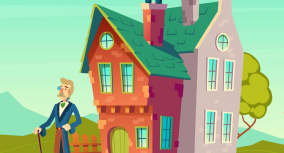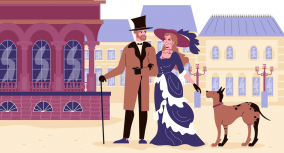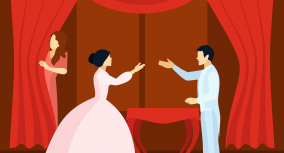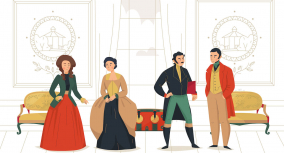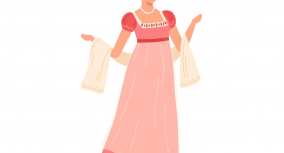The key themes in A Doll’s House are love and marriage, money and work, and feminism and gender roles. Considering that the laws and social norms were drastically different back when the play was written, these themes remain progressive and intriguing to study.
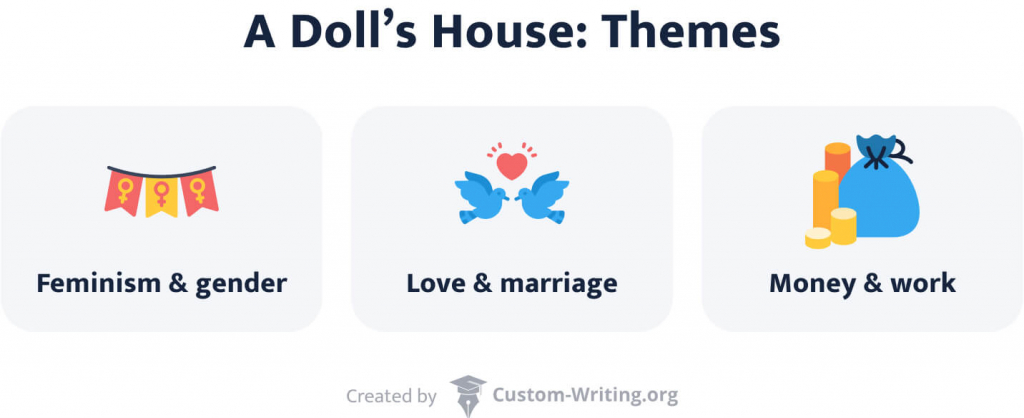
Unfair gender roles and the struggle for women’s rights became prominent only a couple of centuries ago. Meanwhile, A Doll’s House‘s themes like marriage and money are timeless. To understand them on a deeper level and learn all about the major ideas in Henrik Ibsen’s A Doll’s House, look through the following analysis by Custom-Writing.org experts.
⚧️ A Doll’s House: Feminism & Gender Roles
In A Doll’s House, the gender roles issue is probably the central theme since it is highlighted throughout the story. Nora and Torvald’s marriage is a mere example of how imbalanced the power was between the genders when the play came out. Moreover, Ibsen illustrates what problems arise from the restricted role of women in society. No one in the story seems to treat Nora seriously, especially male characters. Her husband often patronizes her and treats her as a child. Even her old friend, Mrs. Linde, seems to be disapproving of Nora’s frivolous behavior. At the same time, the woman acts like she doesn’t mind it and plays along with everyone’s remarks.
As the plot unfolds, Nora shows some signs of disobedience and dissatisfaction with the limits of her role. Not only does she eat sweets forbidden by Torvald, but she also risks everything and illegally borrows money behind his back. While revealing the secret to Mrs. Linde, Nora takes pride in what she did and confesses that it felt good to be in power to do it. Eventually, her financial speculation turns out to be a threat to the Helmers. However, her desire to have more rights grows over the course of the play. By the end, Nora tells Torvald that she hasn’t been perceived as an independent person with her own point of view.
The only way out for her is to leave the family. Even Torvald’s promises to change don’t make a difference. It shows that Nora realizes the root cause of her issues. Her husband is only a part of the problem. The root cause hides in the society and the norms of domestic life it has created. Both legally and culturally, women weren’t recognized as independent persons.
Meanwhile, men are portrayed as ambitious and powerful. They take the responsibility of caring for their families and strive to achieve more, both in careers and lives. Feminism in A Doll’s House is highlighted by both Nora and Mrs. Linde wanting to find their place in life.
A Doll’s House: Quotes on Gender Roles
Try and calm yourself, and make your mind easy again, my frightened little singing-bird. Be at rest, and feel secure; I have broad wings to shelter you under.
A Doll’s House, Torvald Helmer, Act III
I will advise you and direct you. I should not be a man if this womanly helplessness did not just give you a double attractiveness in my eyes.
A Doll’s House, Torvald Helmer, Act III
There is something so indescribably sweet and satisfying, to a man, in the knowledge that he has forgiven his wife… It seems as if that had made her, as it were, doubly his own; he has given her a new life, so to speak; and she has in a way become both wife and child to him.
A Doll’s House, Torvald Helmer, Act III
Papa… called me his doll-child, and he played with me just as I used to play with my dolls.
A Doll’s House, Nora Helmer, Act III
I have existed merely to perform tricks for you, Torvald. But you would have it so. You and papa have committed a great sin against me. It is your fault that I have made nothing of my life.
A Doll’s House, Nora Helmer, Act III
💞 A Doll’s House: Love & Marriage
Even though the main focus of the play is on Nora and Torvald, their marriage is not the only example of the love theme introduced by Ibsen. It seems like every adult in A Doll’s House has experienced a troubled and unhappy relationship. Dr. Rank has never been married but hides his love for Nora in secret. Mrs. Linde and Krogstad once had to part due to unfortunate circumstances. Meanwhile, every female character has been forced to sacrifice something in marriage.
Even though Nora and Torvald seem to be in love and happy, they must obey the social rules. For example, Torvald is quite concerned about his reputation. Therefore, Nora’s loan and decision to leave the family can leave a mark on his social position and career. Their relationship is perceived as exemplary on the outside. However, the audience finds out later that Nora made a financial decision and committed a crime without telling her husband. Society despised such behavior even though she used it as the means of saving her beloved’s life. Therefore, we can conclude that love was priced less than accepted marital rules.
Nora believes that Torvald only pretends to care about their social status so much. She was counting on that while breaking the law and borrowing that money. However, Torvald’s reaction to this secret being revealed clearly shows that reputation is, in fact, all he cares about. He wasn’t pretending to put it above love for Nora. It makes the woman disappointed in her marriage and family life. Moreover, she concludes that the whole institution must be flawed since it doesn’t nourish any deep feelings such as love and mutual respect.
Mrs. Linde and Krogstad, on the other hand, find happiness in their arranged marriage. Even though it goes against the main idea of the play, the couple is still far from the socially accepted relationship. Mrs. Linde only wants it to find her purpose, while Krogstad is happy to use Mrs. Linde as a trophy and a booster for this career and reputation.
A Doll’s House: Quotes on Love & Marriage
He said I was thoughtless, and that it was his duty as my husband not to indulge me in my whims and caprices—as I believe he called them.
A Doll’s House, Nora Helmer, Act I
Oh, I have known your husband from our student days. I don’t suppose he is any more unassailable than other husbands.
A Doll’s House, Nils Krogstad, Act I
I know that what you did, you did out of love for me… You have loved me as a wife ought to love her husband. Only you had not sufficient knowledge to judge of the means you used.
A Doll’s House, Torvald Helmer, Act III
You have never loved me. You have only thought it pleasant to be in love with me.
A Doll’s House, Nora Helmer, Act III
I have been your doll-wife, just as at home I was papa’s doll-child; and here the children have been my dolls… That is what our marriage has been, Torvald.
A Doll’s House, Nora Helmer, Act III
💰 A Doll’s House: Money & Work
The theme of money in the play can’t be underestimated. It seems like all main characters in A Doll’s House need more financial security. For example, Torvald brags about his new position in the bank, which more income. However, he still warns Nora about their budget and tells her not to spend so much. Mrs. Linde has lost her husband, so she is forced to seek a job. She replaces Krogstad at his bank position, which causes him to blackmail Nors in order to get it back. In a way, the bank serves as a symbol of financial stability for all of them.
We can also trace how the themes of money and power are interconnected. The first example pops up as early as in the first scene when Torvald makes a few comments on Nora being a spendthrift. He controls how much she can spend, which puts him in control of her. At the same time, this theme is also related to gender roles and feminism. Nora owes Krogstad, which indicates that he also has power over her.
Moreover, it is obvious how both Mrs. Linde and Nora have limited financial opportunities. They can’t earn a lot money as men do due to gender restrictions of the time. It wasn’t even that easy for women to find a decent job.
On the other hand, there is another side of the medal. While money is shown as something leading to more power, Ibsen highlights that this path can be dangerous. Nora borrowed a large sum from Krogstad, not even thinking about the consequences at the time. It doesn’t matter how proud she is at the beginning to have found money for Torvald’s treatment herself. Throughout the play, it is revealed that such a decision only brought worries, shame, and dreadful anticipation. Therefore, the excitement of getting more money can be perceived as something negative in the play.
A Doll’s House: Quotes on Money and Work
You haven’t any idea how many expenses we skylarks and squirrels have, Torvald.
A Doll’s House, Nora Helmer, Act I
We have not been in a position for me to waste money. We have both had to work… Odds and ends, needlework, crotchet-work, embroidery, and that kind of thing.
A Doll’s House, Nora Helmer, Act I
Many a time I was desperately tired; but all the same it was a tremendous pleasure to sit there working and earning money. It was like being a man.
A Doll’s House, Nora Helmer, Act I
Within a year I shall be the manager’s right hand. It will be Nils Krogstad and not Torvald Helmer who manages the Bank.
A Doll’s House, Nils Krogstad, Act II
Nils, a woman who has once sold herself for another’s sake, doesn’t do it a second time.
A Doll’s House, Christine Linde, Act III
Thank you for reading this article! If you need more information about literary themes, check the article about themes in literature. You might also want to take a look at A Doll’s House essay topics collection. And if you need to make the text of your essay more colorful, try our paraphrasing tool. Any questions left? Check the QA section!
🔗 References
- The Project Gutenberg eBook of A Doll’s House, by Henrik Ibsen
- ‘A Doll’s House’: Themes and Symbols – ThoughtCo
- How Ibsen’s ‘A Doll’s House’ Helped Invent Feminism
- The Doll House Backlash: Criticism, Feminism, and Ibsen – JStor
- A Doll’s House: Gender Performativity, Quest for Identity and Production Shifts Over Time
- What Did Nora Do? Thinking Gender with A Doll’s House
